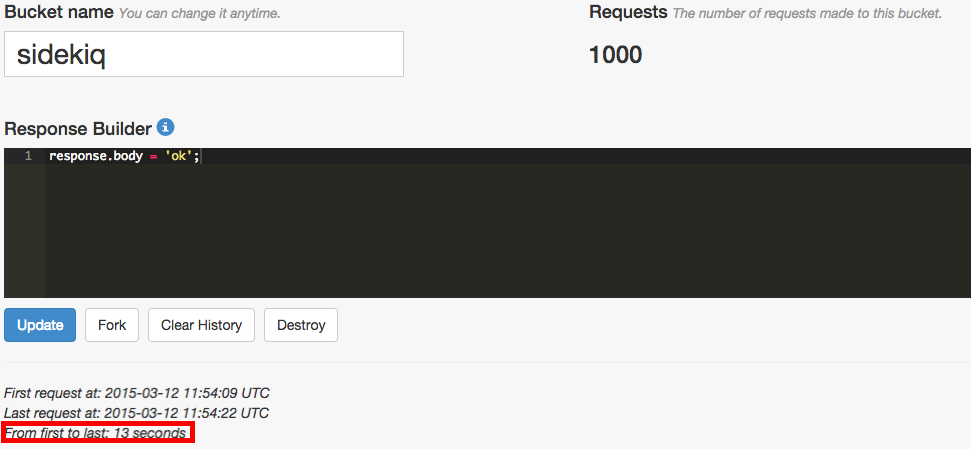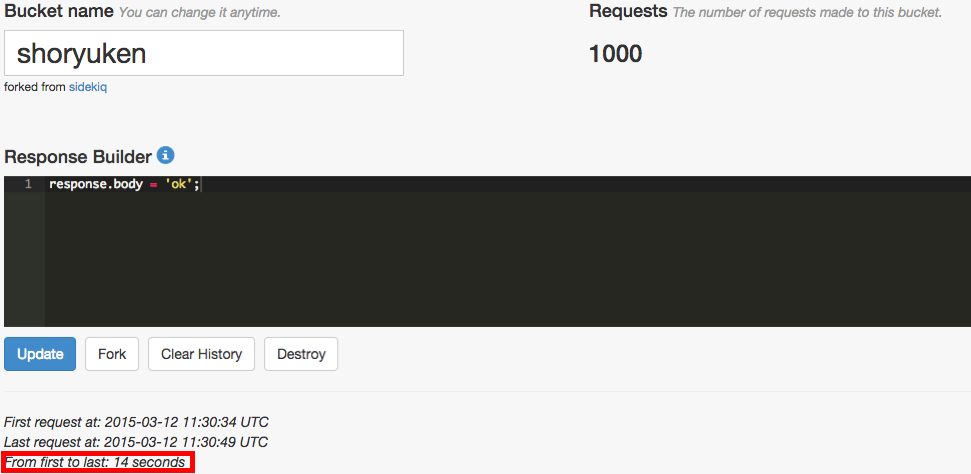Sidekiq (Redis) vs Shoryuken (AWS SQS)
14 Mar 2015DISCLAIMER: This post is not intended to compare Sidekiq and Shoryuken implementations. Both are very similar, actually Shoryuken started as a shameless copy of Sidekiq <3 open source. The idea of this post is to compare Sidekiq as a Redis based queue system with Shoryuken as a SQS client.
Resque > Sidekiq > Shoryuken
Before Sidekiq, Resque was the main option to go for background jobs for many Rubyists. But Sidekiq changed that, mainly because it uses threads instead of process forking (Resque). No matter how many improvements MRI is receiving on process forking, we can’t get the same performance (usage of resources) using forks as we get with threads. You can check some Sidekiq testimonials confirming that.
But the game is changing again - it’s Shoryuken time.
With Sidekiq:
- If you are not using the Pro version (which costs $750/year) and your process crashes while consuming jobs, you will lose your jobs
- If your Redis master crashes before having replicated your jobs to the slaves, you will lose your jobs
- If your jobs load increases, you will need a more powerful Redis. More jobs, more Redis, more Money
- If you don’t have a Redis cluster, eventually you will lose everything
No Dead Letter Queues supportDead Job Queue support- No Fanout support
- You need to host its dashboard (console)
- You can use sidekiq-statsd or Sidekiq pro/Metrics to send metrics to Statsd for distribution to Graphite, Librato Metrics, etc, but you will need these services running somewhere
With Shoryuken:
- If your process crashes, your jobs will return to the queue after its visibility timeout expiration, nothing will be lost
- If a SQS node crashes, you don’t care, nothing will be lost
- If your jobs load increases from 1 to 1 million, you don’t care, SQS handles that for you
- Dead Letter Queues support - move messages after a configurable number of failures to a specific queue
- Fanout support via SNS - send a message once and distribute across multiple queues
- Hosted console
- You can monitor your queues with CloudWatch and send alarms (Email, SMS, HTTP calls etc) when a threshold is breached
Perfomance
WARNING: SUBJECTIVE PERFORMANCE TESTS!!!
Are you wondering about performance? I would be, Redis is super fast.
To test performance, I created two projects:
Test plan:
- Send 1k jobs
- Make a HTTP call per job to a PutsReq bucket
- Compare the “From first to last” result
Result:
- Sidekiq took 13 seconds to consume 1k jobs
- Shoryuken took 14 seconds to consume 1k jobs


Although the jobs consumption result was pretty close, sending jobs with Sidekiq is clearly faster than with Shoryuken.
- Sidekiq took 2278.37ms to send 1k jobs (2.28ms per send)
- Shoryuken took 55629.93ms to send 1k jobs (55.63ms per send)
The jobs where enqueued using Heroku (Amazon EC2, us-east-1) via heroku run rake populate - this Rake task is available on the linked projects above.
Yeah, Redis write performance is amazing. But is 55.63ms much?
Every time you run these tests you will get a different result, but in most cases Sidekiq is slightly faster to consume and clearly faster to send jobs than Shoryuken.
More than once while trying bigger batches with Sidekiq, I got less requests on PutsReq than the jobs sent. Shoryuken was consistent, the number of jobs sent was the number of requests shown on PutsReq.
Pricing
SQS is a paid solution. You can run Sidekiq for free using Heroku with something like Redis To Go.
Nope! SQS can be also free or cheaper than Sidekiq:
Shoryuken
- $0
- First 1 million Amazon SQS Requests per month are free
- $0.50 per 1 million Amazon SQS Requests per month thereafter ($0.00000050 per SQS Request)
Sidekiq
- $0
- $750/year
- Starts at $0 for a very limited option. But keep in mind that Redis To Go isn’t an HA solution, they don’t offer a Redis cluster, so it’s a SPOF. For an HA solution they recommend ObjectRocket, which starts at $59/month
From Sidekiq to Shoryuken
Did I convince you?
Have a look at the migration steps: From Sidekiq to Shoryuken.
Conclusion
There’s no silver bullet solution. If your workers aren’t thread safe workers, maybe you should stick with Resque. If the performance difference between Shoryuken and Sidekiq matters to you, go with Sidekiq.
The point I’m trying to make is that in general for background jobs in Ruby, IMO Shoryuken/SQS is the new main option to go. It’s fast, durable, distributed, auto scalable, cheap (or even free) and you don’t need to care about the infrastructure, AWS will handle that for you.